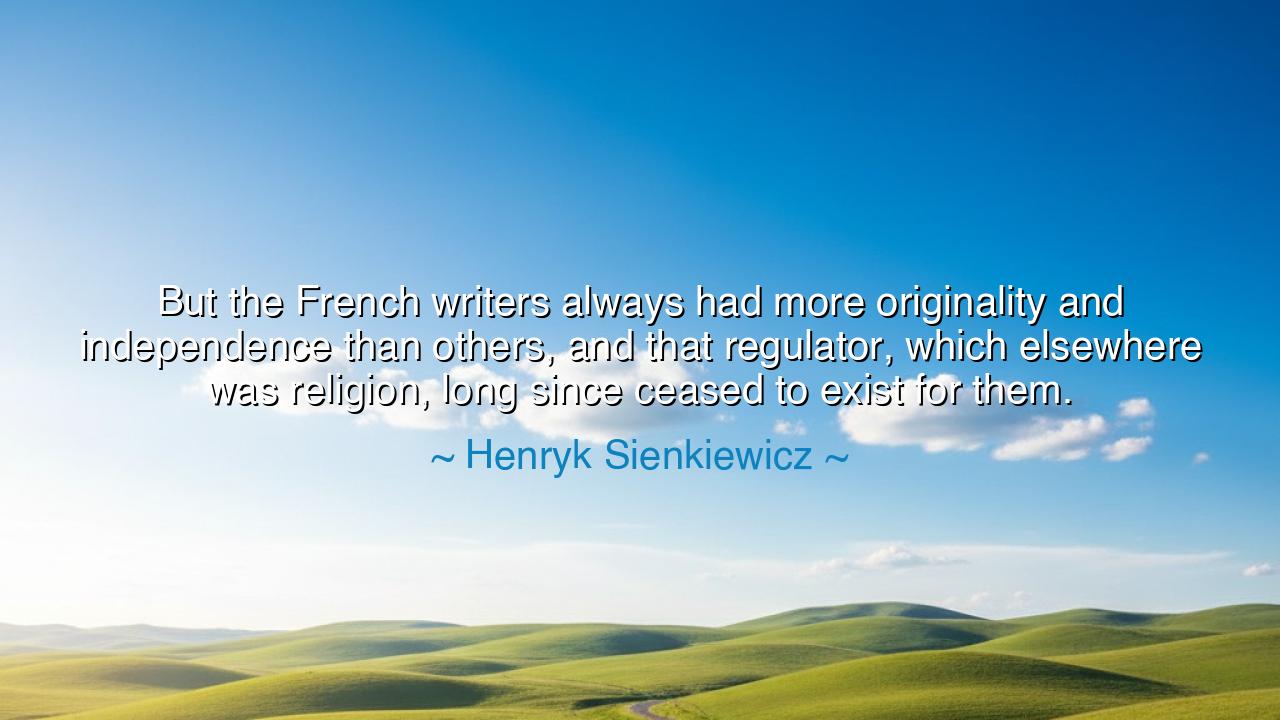
But the French writers always had more originality and
But the French writers always had more originality and independence than others, and that regulator, which elsewhere was religion, long since ceased to exist for them.






Hear the profound reflection of Henryk Sienkiewicz, the great Polish novelist and moral thinker, who once declared: “But the French writers always had more originality and independence than others, and that regulator, which elsewhere was religion, long since ceased to exist for them.” In these words lies both admiration and warning — a tribute to the genius of the French mind, and a meditation on the power and peril of intellectual independence unrestrained by faith or tradition. Sienkiewicz speaks as one who revered creativity, but who also knew the dangers of freedom without foundation, of thought unmoored from the eternal truths that give it direction.
To understand the origin of these words, we must remember the world from which Sienkiewicz spoke. He lived in the nineteenth century, a time when Europe was changing — the old certainties of religion and monarchy were crumbling before the advance of reason, revolution, and science. France, the cradle of enlightenment and rebellion, stood at the forefront of this transformation. Its writers, from Voltaire and Rousseau to Hugo, Zola, and Flaubert, broke every chain that tradition had once placed upon thought. They sought truth in man, not in heaven; they replaced the authority of the Church with the authority of the individual mind. And in this boldness, Sienkiewicz saw both brilliance and danger.
He praised their originality, for they dared to think where others feared to question. The French writers did not merely copy the forms of the past — they created new worlds of expression, from the fiery satire of Voltaire to the realism of Balzac, from the romantic heights of Victor Hugo to the moral storms of Diderot. Their independence gave them power to challenge kings, to inspire revolutions, to awaken nations. Yet, in the same breath, Sienkiewicz mourned what had been lost. For where other nations still drew moral strength from religion — from that “regulator” that balanced freedom with humility — the French spirit, in its quest for liberty, had cast aside the sacred compass that once guided its steps.
In this, his words echo an ancient truth. For the ancients themselves taught that freedom without measure becomes its own tyranny. The Greek philosophers spoke of the need for order within liberty — that unbounded independence, like an unbridled horse, may lead its rider to destruction. So too did Sienkiewicz warn that when art and intellect break free from the moral gravity of faith, they may soar for a moment in dazzling brilliance — but risk burning out like Icarus, too near the sun of self-worship. He did not scorn the French genius; he feared for it. For what is independence, if it no longer answers to truth? What is originality, if it forgets the eternal laws that give creation its meaning?
Consider the story of the French Revolution, born of philosophy and fed by words. The great thinkers of France gave birth to ideals of liberty, equality, and fraternity — noble and immortal truths. Yet, when the revolutionaries severed those ideals from moral restraint, when the voice of conscience was silenced by the roar of the mob, the guillotine became their new altar. The same independence that freed the people also devoured them. Here, Sienkiewicz’s insight stands revealed: when the “regulator” of faith is gone, reason itself can turn to madness, and creation to chaos.
But his message is not one of despair. Rather, it is a call for balance, for the harmony of reason and reverence, of freedom and faith. Sienkiewicz believed that true originality arises not from rebellion alone, but from the meeting of the human and the divine — from the artist’s ability to express eternal truths through the freedom of his own soul. A writer, he implies, must be both explorer and servant: free to create, yet bound to the good. Just as a river gains its power by flowing within its banks, so too does the human spirit find greatness when guided by moral law.
Thus, the lesson is clear: independence is a gift, but one that demands wisdom. Use it not to defy truth, but to discover it anew. Let your creativity be daring, but not rootless; let your freedom be brave, but not blind. For even the stars, in their vast autonomy, move according to divine order — and it is that order which makes their beauty possible. As Sienkiewicz teaches, originality without virtue is a flame without warmth; it dazzles, but does not give life.
So, my children, remember this teaching: seek your independence, but do not lose your regulator. Create boldly, think freely, live passionately — but let your conscience be the light that guides your steps. For in the union of freedom and faith, of intellect and humility, lies the true glory of the human spirit — a glory that endures beyond the fashions of nations, and stands, eternal, in the sight of heaven.






AAdministratorAdministrator
Welcome, honored guests. Please leave a comment, we will respond soon